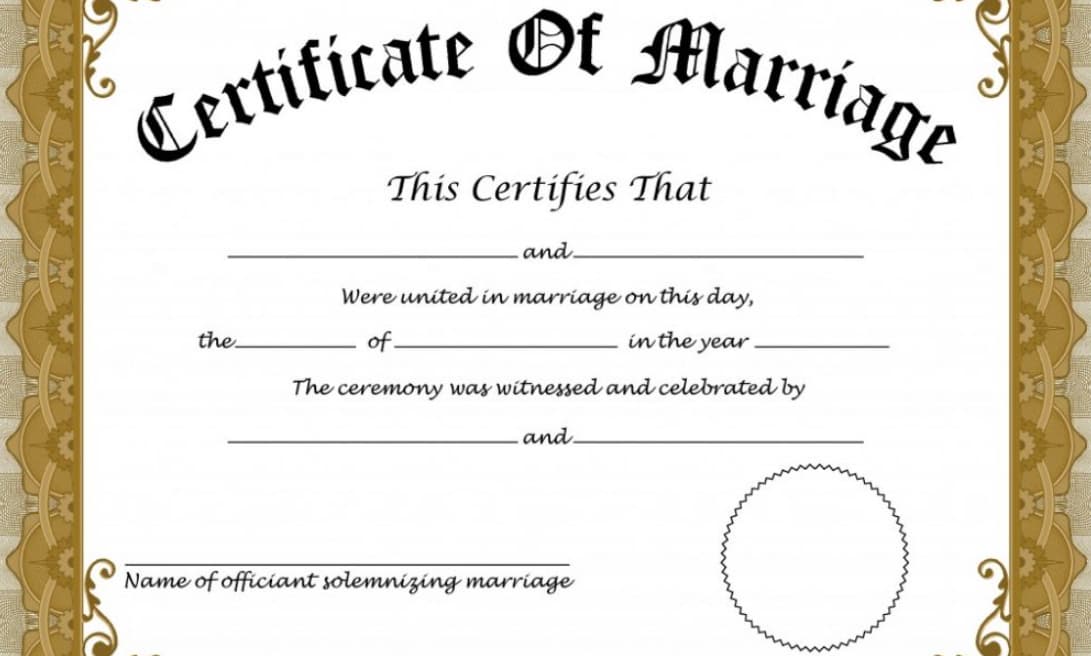Getting married marks the beginning of a new chapter in a couple’s life journey. While the elaborate wedding celebrations bring immense joy, registering the marriage legally ensures that the marital union is valid as per governmental records. An online marriage registration system now makes completing this formal procedure easier than ever before.
With just a few clicks, couples can fill out and submit the application form along with supporting documents to receive an official marriage certificate digitally signed by the registrar.
This legally valid document serves as proof of marriage across all government and non-governmental organizations when applying for visas, loans, or investments as a married couple. Registering online eliminates the need to visit crowded government offices and deal with complex paperwork. It also facilitates tracking application status effortlessly.
Marriage Registration Certificate Online

Therefore, online portals have provided increased accessibility, convenience, and transparency to Indian couples who can now obtain a certified marriage registration certificate rapidly without stepping outside their homes.
This registration safeguards the legal rights of married couples besides documenting their relationship for future reference.
Marriage Registration – Overview
Marriage registration refers to formally recording a marriage with the relevant government authorities to ensure its legal validity.
Key aspects include:
- It provides legal proof of the marital union as per governmental records.
- The registration process can vary across states/UTs but involves the submission of standard documents.
- With online portals, registration formalities can be completed digitally without visiting offices.
- Once registered, a marriage certificate is issued to the couple signifying proof of their lawful marriage.
Marriage Registration Benefits
Here are some of the major advantages of registering one’s marriage:
- Legal validity and recognition of marital status.
- Ability to access legal rights available to married couples.
- Necessary to change the name on official documents.
- Simplifies processes like visa applications where proof of marriage is required.
- Entitlement to spousal insurance, bank accounts, investments, etc.
- Safeguarding asset inheritance and succession rights.
- Basis for obtaining child custody and claiming maintenance rights.
- Tax benefits and exemptions are available under income tax laws.
Therefore, marriage registration safeguards the legal rights and interests of each partner besides documenting their relationship officially.
Process of Marriage Registration
The process entails these key steps:
- Identify Applicable Marriage Law
Laws like the Hindu Marriage Act, Special Marriage Act, etc. provide a legal framework.
- Prepare Required Documents
- Proof of name, age, identity, address, etc. of bride and groom
- Wedding photographs
- Copy of wedding invitation card
- Fill Application Form
Provide personal details and self-declaration affirming eligibility
- Submit Fee
Registration fee is payable to e-portal or directly to the registrar’s office
- Track Application Status
The online portal allows checking status updates easily till the certificate is issued.
Complete Guide on How to Register a Marriage in India
Procedure to Check Marriage Registration Online Application Status:
- Visit Official Portal
Access the digital platform used for registration in your state.
- Find Status Tracking Section
Locate the link indicating application status or certificates.
- Enter Reference Number
Type in the unique number provided at the time of form submission.
- View Latest Update
The Portal displays the stage application is in – pending, approved, rejected, etc.
- Take Print If Required
Can save digitally or take a printout for personal reference.
Documents Required for Marriage Registration
Essential documents needed from each party:
- Proof of identity – Aadhaar, PAN, or office ID cards
- Proof of age – Birth certificate, passport copy, or 10th certificate
- Address proof – Voter ID, electricity bill copy, or rent agreement
- Marital status proof – Affidavit or prior marriage certificates
- Wedding photos
- Copy of wedding card
- Passport-size photos
Additional documents may be required in certain cases like divorce decrees for remarriage registration.
Marriage Certificate and Purpose
A marriage certificate formally acknowledges the lawful union of two people as per governmental records. Key purposes:
- Confirms change in legal marital status.
- Can serve as identity proof where the spouse’s name change is reflected.
- Supports legal claims where proof of relationship is required.
- Enables access to state benefits for married couples.
Therefore, this certificate validates the marriage legally and is key for accessing any marital rights.
Requirements for Marriage Registration
These are the key requirements for Indian citizens to register their marriage:
- The legal marriage age is 21 years for men and 18 years for women.
- Should not have a living spouse from a previous subsisting valid marriage.
- The bride and groom cannot fall within the prohibited relationship as per law.
- Both parties must be present before the marriage registrar along with witnesses.
- Should furnish required valid documents proving identity and eligibility.
Rules for Marriage Registration
Notable governing norms include:
- Registration is mandatory as per the Special Marriage Act within 60 days
- Hindus, Muslims, and Christians can optionally register under religious laws
- Witnesses must verify marriage happened and confirm identities
- Parties must be legally capable to marry and consent without coercion
- Registrar can decline registration if not satisfied with submitted documents
Strict adherence to these statutory rules is necessary for valid registration.
Witness for Marriage Registration
Basic norms concerning witnesses:
- A minimum of 1 witness from each side is needed during registration
- Witness has to be an adult as per law with sound mental capacity
- Cannot be a party to the marriage or close blood relative of bride/groom
- Must furnish valid ID proof establishing identity
- Required to endorse and attest marriage application
Therefore, credible witnesses certify the occurrence of legal marriage with no objections.
| Offense | Penalties |
|---|---|
| Furnishing false information | Fine up to Rs. 10,000 or 5 years imprisonment or both |
| Non-registration of marriage | Civil penalties/denial of marital rights under law |
| Impersonation to get marriage registered | Fine up to Rs. 10,000 and 7 years imprisonment |
| Child marriage | Fine up to Rs. 2,00,000 and imprisonment up to 2 years |
Hence both monetary fines as well as imprisonment for serious violations.
Importance of Marriage Registration
Significance of registering a marriage:
- Confers legal status to the matrimonial alliance
- Basis for claiming religious rites and inheritance rights
- Needed for obtaining child custody and widowed pension
- Simplifies getting joint visas/availing overseas postings
- Basis for clubbing income and claiming tax deductions
- Safeguards property rights in case of marital dispute or divorce
Therefore, registration gives social recognition besides access to legal processes like divorce that require formal documented proof of marriage.
| Act | Applicability | Registration | Divorce |
|---|---|---|---|
| Hindu Marriage Act | Hindus, Buddhists, Jains & Sikhs | Optional | Permitted on specific grounds |
| Muslim | Muslims only | Not mandatory; Can optionally do for record | Follows Muslim personal law & Sharia code |
| Indian Christian Marriage Act | Christians | Optional but best to register formally | Allowed as per Indian Divorce Act, 1869 |
| Special Marriage Act | Inter-caste & inter-religion marriages | Mandatory to register within 30 days | Divorce process specified in the Act |
| Act | Applicability | Registration | Divorce |
|---|---|---|---|
| Special Marriage Act | Inter-caste & inter-religion marriages | Mandatory to register within 30 days | Divorce process specified in the Act |
The registration forms and divorce processes vary across religious marriage acts. Interfaith couples can register under the Special Marriage Act.
FAQs on Marriage Registration Certificate Online:
- Q1. Can we apply for marriage registration online in India?
Yes, many state portals like Maha Online and Delhi e-District allow online registration applications with document upload and fee payment.
- Q2. Can I get a marriage certificate online on the same day in India?
No, the issue of the certificate takes due processing time after verification hence is not instant. Provisional registration can be obtained quicker.
- Q3. What is the Hindu Marriage Act 1955?
It is the law governing Hindu marriages laying down conditions, procedures, and divorce process for Hindu couples specifically.
- Q4. Can I get a marriage certificate anywhere in India?
The certificate is jurisdiction-specific depending on the place of marriage. You can obtain a certified copy for use in pan-India.
- Q5. How long does it take to get a marriage registration certificate online in India?
Online portals speed up the process but still can take 15-30 working days approximately after all verification.
- Q6. Can you register a marriage without a ceremony?
Yes, under the Special Marriage Act parties can directly register with the Registrar’s office instead of having separate ceremonial weddings.
- Q7. What if corrections need to be made to the Marriage Registration Certificate?
You have to apply to the Registrar’s Office for certificate modification by providing a copy of the certificate and the reason/proof for correction required.
- Q8. What care should be taken while making a marriage registration certificate?
Furnish accurate personal details, ensure witnesses endorse properly, and keep soft and hard copies safely.
- Q9. What if we have corrections to be made to the marriage registration certificate?
Approach the concerned office for certificate correction by providing requisite supporting documents. Modification endorsement reflects changes then.
- Q10. Can marriage be registered from a different city in India?
Yes, they can provide details of the jurisdiction where the wedding happened. Remote registration is possible with the right paperwork.
Conclusion
Marriage registration formally validates the matrimonial union legally while enabling couples to access all rights available to married individuals. The online registration process brings simplicity, speed, and transparency to applicants.
Right documentation and adherence to some basic rules facilitate smooth registering the marriage. Apart from safeguarding current rights, it assists in times of bereavement or disputes later.
Seeking expert guidance helps in flawless application ensuring couples receive an accurate certification promptly.



